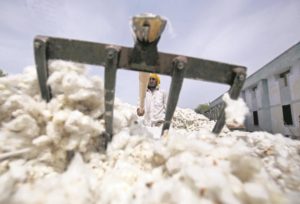
ABOUT
What was the nature of trade relations between India and Pakistan, and why did they sour? And why does Pakistan want to ease the ban on imports of these products now?
WHY IN NEWS?
Pakistan’s Economic Coordination Committee (ECC) has allowed the import of cotton and yarn from India, Reuters has reported, quoting unnamed sources.
The top decision-making body was meeting on Wednesday (March 31) afternoon to discuss the possibility of restarting the import of cotton, cotton yarn, and white sugar following its nearly two-year long ban on trade with India.
India and Pakistan’s trade relations before the ban
Trade between the subcontinental neighbours has always been linked to their political interactions, given their tumultuous relationship.
For instance, India’s exports to Pakistan dropped by around 16 per cent to $1.82 billion in the 2016-17 financial year from $2.17 billion in 2015-16. This coincided with the rise in tensions between the two countries following the terrorist attacks in Uri in 2016, and the surgical strikes by India against Pakistan-based militants.
Trade between the two countries grew marginally in subsequent years despite continuing tensions, with India’s exports to Pakistan increasing nearly 6 per cent to $1.92 billion in 2017-18, and by around 7 per cent to $2.07 billion in 2018-19.
Imports from Pakistan, though much lower than India’s exports to the country, also increased by 7.5 per cent to $488.56 million in 2017-18 from $454.49 million in 2016-17.
Growth of imports from Pakistan slowed to around $494.87 million in 2018-19 — an increase of around 1 per cent — before political relations between the two countries took a turn for the worse in 2019.
Why did Pakistan ban trade with India?
- Pakistan’s decision to suspend bilateral trade with India in August 2019 was primarily a fallout of India’s decision to scrap Article 370 — the constitutional provision that recognised the special status of the state of Jammu and Kashmir and afforded it a certain amount of autonomy.
- However, an underlying reason for suspending trade between the two countries was also the 200 per cent tariff imposed by India on Pakistani imports — a move that India implemented earlier that year after revoking its status as a Most Favoured Nation following the suicide bomb attack on the CRPF in Pulwama.
- Pakistan’s announcement, coupled with India’s decision to revoke its MFN status and hike duties on its goods, were considered by some experts to be one of the most drastic trade measures taken in the souring diplomatic relations between the nations.
- Trade between the two countries suffered greatly in 2019-20, with India’s exports to Pakistan dropping nearly 60.5 per cent to $816.62 million, and its imports plummeting around 97 per cent to $13.97 million.
Why is Pakistan’s ECC meeting to discuss allowing cotton and sugar imports now?
- The proposal to lift the ban on cotton imports came in the backdrop of a shortfall in raw material for Pakistan’s textile sector, which has reportedly been facing issues due to a low domestic yield of cotton in the country.
- On top of this, imports from other countries like the US and Brazil have reportedly been more expensive, and take longer to arrive in the country.
- Cotton has been one of Pakistan’s major imports from India. In 2018-19, Pakistan imported $550.33 million worth of cotton from India.
- When coupled with $457.75 million worth of organic chemicals, these products made up around half of its total imports from India.
- In 2019-20, however, India’s cotton exports to Pakistan dropped to $64.25 million.
- Where sugar is concerned, trade experts feel it is a result of a long-standing interdependence between India and Pakistan over such agricultural commodities and a potential shortage in domestic supply.
- Interestingly, Pakistan’s imports of sugar between July-February 2020-21 soared by nearly 6,296 per cent to 278,733 metric tonnes from 4,358 metric tonnes in the same period in 2019-20.
- In terms of value, Pakistan spent $126.99 million on these imports, according to the country’s trade statistics.
- The import bill this year also increased because we had to import wheat and sugar to stabilise the market prices.

